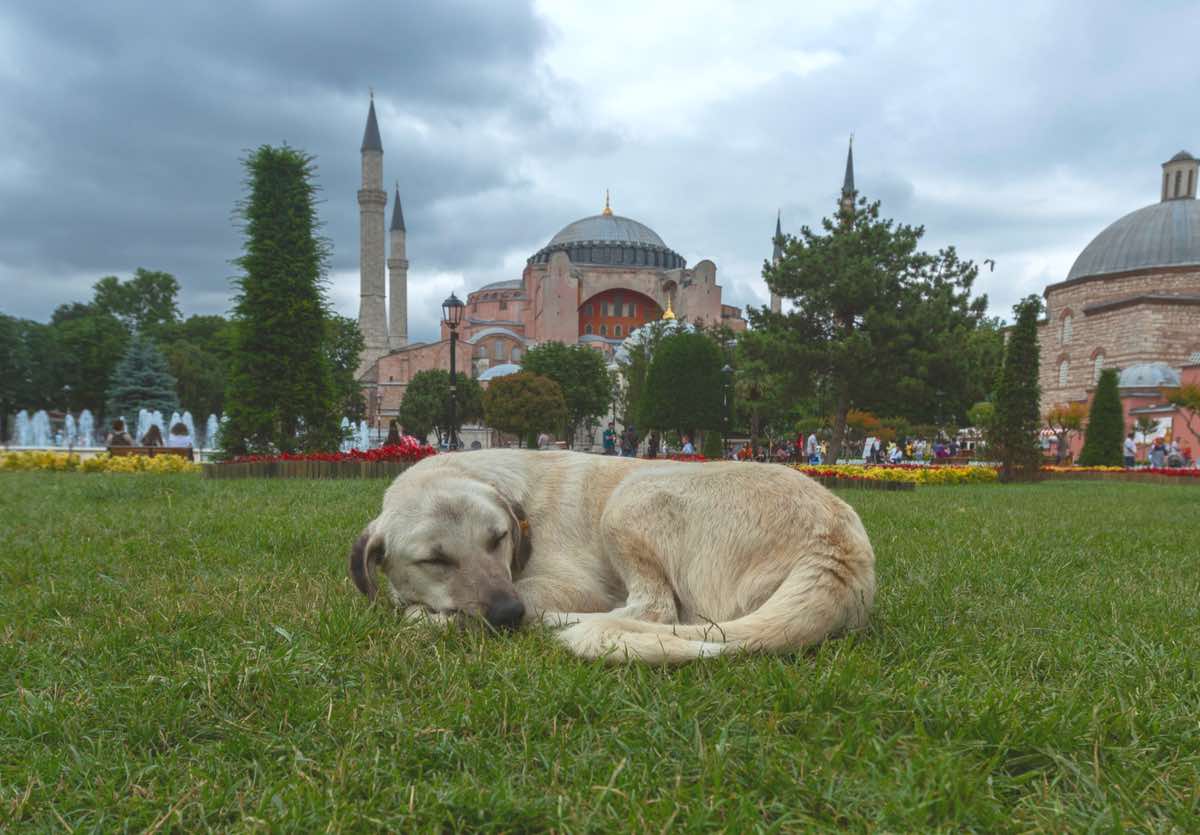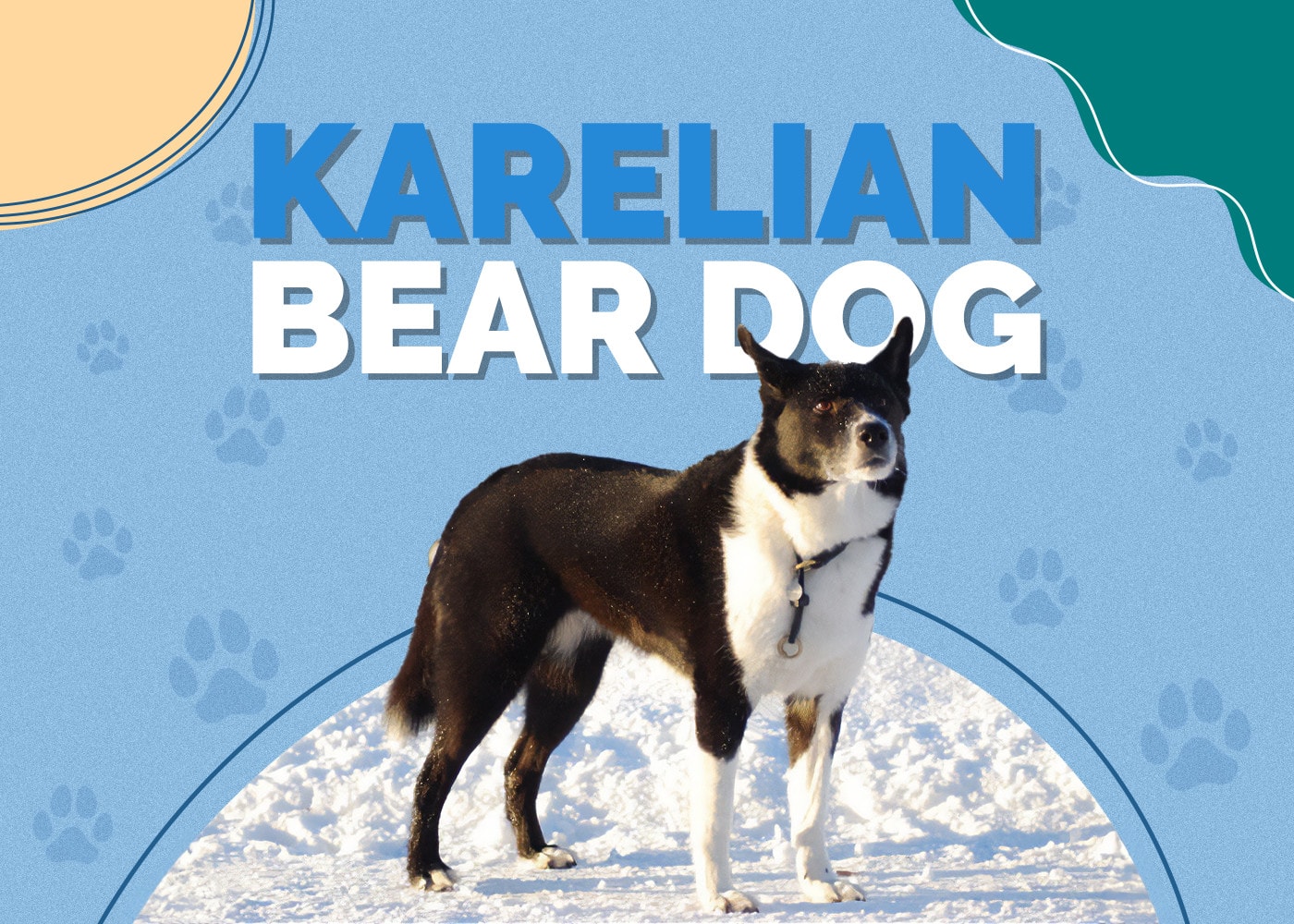Rhodesian Boxer (Rhodesian Ridgeback & Boxer Mix) Info, Pics, Facts

Updated on
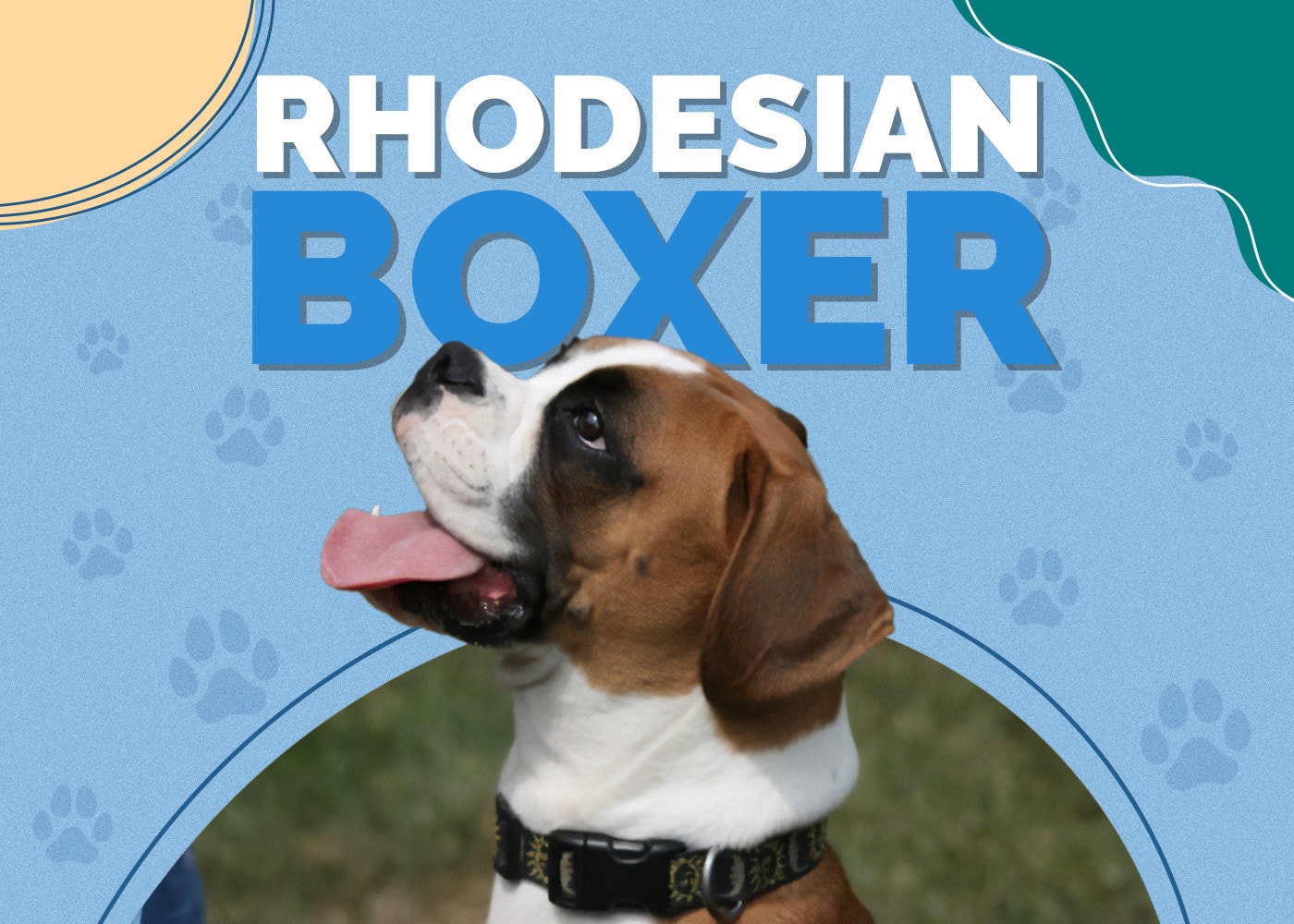
Height:
22 – 27 inches
Weight:
55 – 80 pounds
Lifespan:
10 – 12 years
Colors:
White, fawn, red, brown, brindle, black
Suitable for:
Active families looking for a loyal and protective companion
Temperament:
Confident, loyal, loving, friendly, intelligent, energetic
The Rhodesian Boxer is a cross between the Rhodesian Ridgeback and the Boxer. The combination of these two strong breeds produces a confident, beautiful, and energetic family-oriented dog. They are too large to be a lap dog but will enjoy cuddling with you on your couch just as much as going for long walks every day.
The Rhodesian Boxer tends to have a strong and muscular body with a deep, sturdy chest and a large, squarish head. The muzzle is usually black and could be long like the Rhodesian Ridgeback or slightly pushed in similar to the Boxer. The ears are triangular and floppy, and they possess a long, straight tail. While they do come in a variety of colors, their short, straight coat tends to run in shades of fawn, brown and gold.
Rhodesian Boxer Puppies
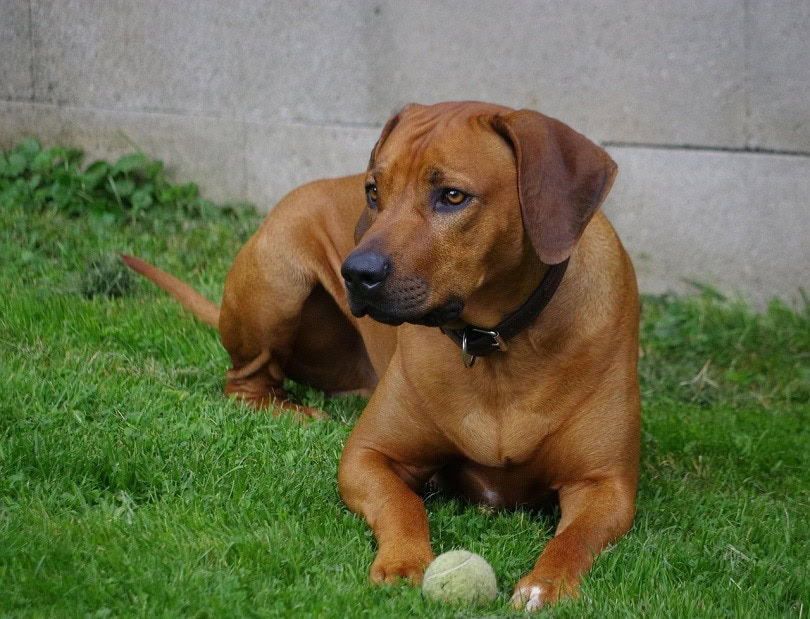
The Rhodesian Boxer is a high-energy dog that does not like to be left alone for long periods. Their intelligence and energy make them highly trainable, although they can be stubborn at times. They have good overall health, and while they are considered friendly dogs, they should be leashed at all times while out for a walk because of their instincts to chase almost anything.
3 Little-Known Facts About the Rhodesian Boxer
1. The Rhodesian Boxer has a high prey drive.
The Boxer comes from the Working Group, and the Rhodesian Ridgeback is from the Hound family. The combination of these two breeds gives the Rhodesian Boxer the urge to chase small animals and must, therefore, be leashed while out or in a properly fenced yard.
2. The Rhodesian Boxer wants to spend time with the family.
They would prefer to stay indoors with you rather than be outdoors alone. If left alone for too long in your yard, they will resort to destructive behavior, and you might find your dog digging holes and ruining the lawn.
3. The Rhodesian Boxer might not do well in the heat.
If your dog has inherited the Boxer’s shorter snout, their health might be affected by high temperatures. Therefore, it would be in the best interests of your dog to keep them from overexerting themselves during the day when it’s at its hottest.
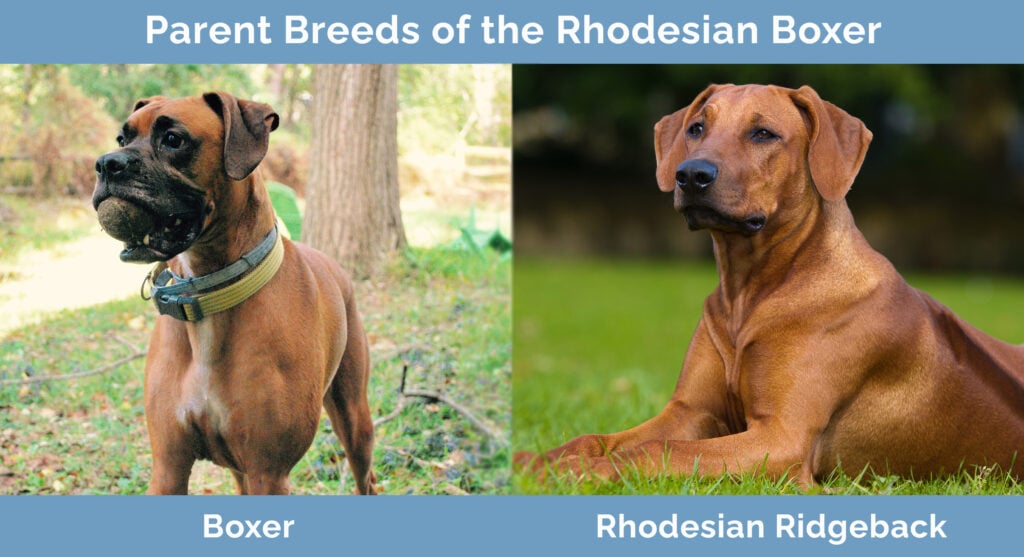
Temperament & Intelligence of the Rhodesian Boxer 🧠
Are These Dogs Good for Families? 🏡
The Rhodesian Boxer loves to play and will get along wonderfully with children. However, because of their large size and the boisterousness of these dogs, supervision with younger, smaller children might be necessary as they could get knocked over.
They are protective of their family and will warn you of strangers approaching the property but are not aggressive and therefore safe around children.
Does This Breed Get Along With Other Pets? 🐶 😽
When socialized as puppies, they get along very well with other pets within the household. However, as already discussed, they are prone to chasing smaller animals, and their instincts might kick in when they see an animal run. They will do well with smaller animals within the household if they are raised with them.
Things to Know When Owning a Rhodesian Boxer:
Food & Diet Requirements 🦴
Rhodesian Boxers are high-energy and should be fed like most large breeds. Feeding them a high-quality dog kibble twice a day should be sufficient while keeping an eye on their weight. Always check with your dog’s vet if you have any concerns regarding their weight or for any other nutritional concerns.
Exercise 🐕
These active dogs require a minimum of one long walk (one hour or more) every day. Because of the working dog background, they do need to keep busy so lots of playtime will be of great benefit. Remember to keep them on a leash and to keep their exertions to a minimum if it’s a hot day.
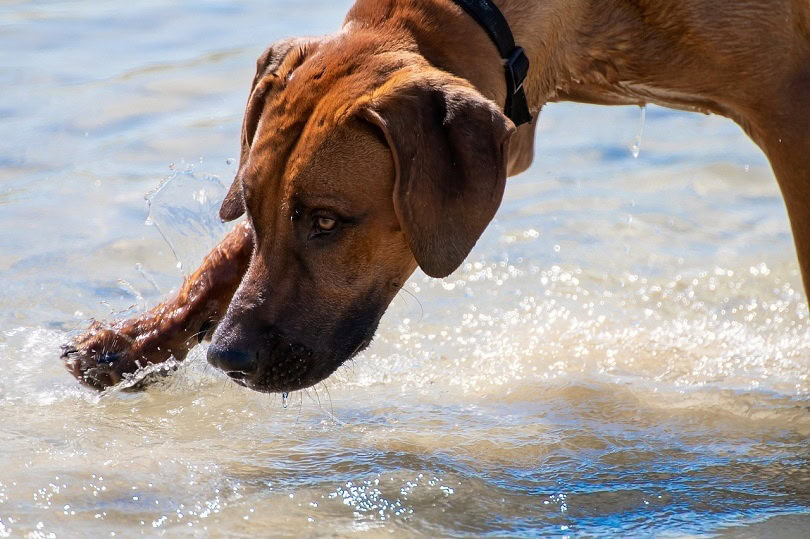
Training 🦮
The intelligence of these dogs makes training more of a challenge due in part to a stubborn streak. Like with most dogs, training with perseverance and patience but with lots of love and positive reinforcement will give you a loyal and devoted dog.
Grooming ✂️
The Rhodesian Boxer has a short, smooth coat that does not require extensive grooming. On average, they do not need to be brushed more than once a week to remove loose hair and to keep their coat shiny. Only give them a bath when necessary (about once a month) using an appropriate dog shampoo.
It’s essential to clean the ears to avoid infections due to wax buildup and to brush their teeth to keep their teeth and gums healthy. It will also give you a break from doggy breath. Trim your dog’s nails regularly, and your dog will thank you. Although not while you’re doing it.
Health and Conditions ❤️
- Elbow dysplasia
- Hypothyroidism
- Deafness
- Hypothyroidism
- Corneal erosion
- Bowel disease
- Hip dysplasia
- Heart disease
- Bloat or stomach dilatation
- Irregular heartbeat
- Spinal cord disease
- Brain tumors
The Rhodesian Boxer should be checked out by the vet on a yearly basis for any issues that might present as they age based on their parent’s health records. As a hybrid, they are much less likely to suffer from the same conditions as a purebred.
The Rhodesian Boxer should have its elbows checked by the vet as well as tests such as a urinalysis to rule out hypothyroidism.
Male vs. Female
The primary difference between male and female Rhodesian Boxers tends to be in size. The female Rhodesian Boxer can be 22 to 25 inches in height and weigh anywhere from 55 to 68 pounds. The male Rhodesian Boxer can be 24 to 27 inches in height and weigh 65 to 80 pounds.
There is the belief that the male Rhodesian Boxer is more aggressive and shows less affection than the female, but there is debate on this subject.
The biological differences are evident with respect to breeding or spaying or neutering your Rhodesian Boxer. Spaying the female Rhodesian Boxer is a more complex surgery than neutering and is, therefore, more expensive and with a longer downtime for your dog in recovery. It is thought that after the surgery, most dogs are calmer and less aggressive.
In general, how your Rhodesian Boxer is raised and how well they’re socialized with strangers and other animals will be the overall determinate of their personality as an adult.
Final Thoughts
The Rhodesian Boxer is the confident and robust offspring of the Rhodesian Ridgeback and the Boxer, both amazing breeds in their own right. They need lots of mental and physical stimulation but play well with children and other household pets if they are raised with them.
Finding one of these puppies can be accomplished by talking to the breeders of Boxers and Rhodesian Ridgebacks who might be able to steer you in the right direction. Keep an eye on dog rescue groups or contact local and national dog clubs as well as attend dog shows. Social media has also proven to be a great way to get in touch with those that can help you further your quest to find a Rhodesian Boxer.
Bringing a Rhodesian Boxer puppy into your family will be a decision not to be taken lightly but one you will not regret. These dogs will be an important part of your family and will bring much happiness and love into your household.
Related Reads:
Featured Image: artbycharlotte, Pixabay



